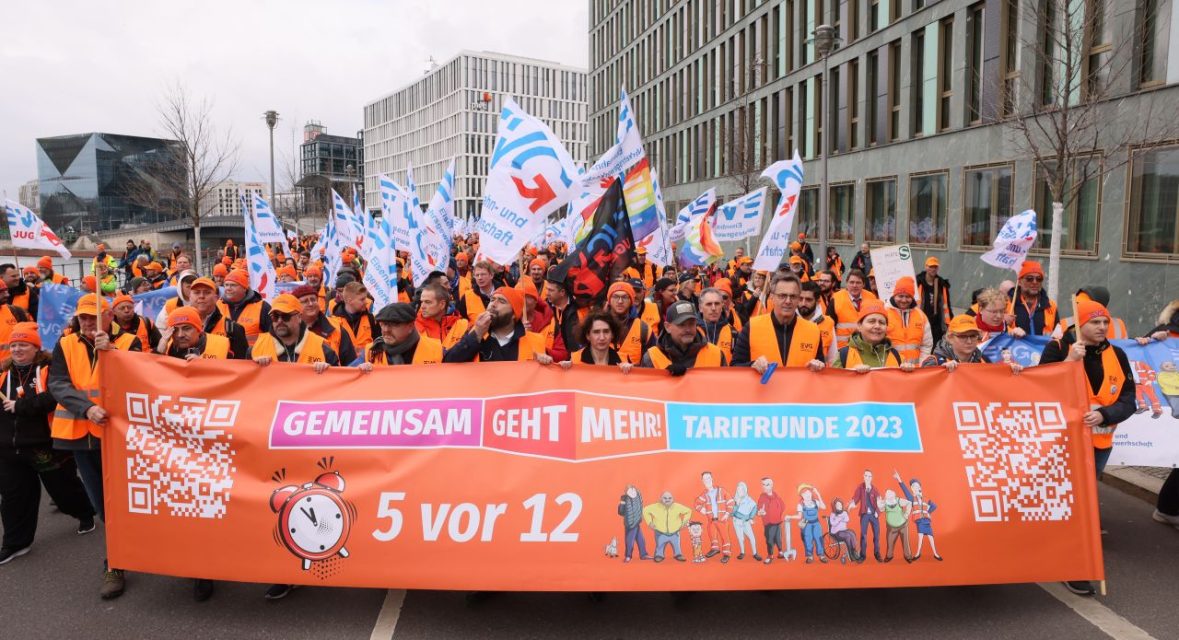German union calls for massive rail strike to start on 27 March

A massive, nationwide rail strike in Germany will start on Monday, 27 March. It will be carried out by the rail union EVG, which represents most of the country’s railway workforce. EVG blamed DB for the impact of a nationwide rail strike in Germany following the unsuccessful collective labour bargaining negotiations. “The danger of a strike in rail transport is real, and Deutsche Bahn is largely responsible for this”, said Kristian Loroch, chief negotiator for EVG.
DB is expressing its worries over the possibility of a strike that could have a massive impact on all German rail operations. In a communication, the company mentioned that it expects massive impairments for all railway operations, including rail freight. Additionally, it mentioned that “DB Cargo will do everything possible to keep the effects of the strike as low as possible and that, above all, it is important to ensure the supply of power plants, seaports, refineries and other key industries”. RailFreight.com is also in contact with other rail operators in Germany to assess the operational impact that the strikes could have.
The next negotiation round between EVG and DB is scheduled for 24 and 25 April, but it’s unclear yet if the warning strike announced will last until then. Loroch’s words come after DB accused EVG of not cooperating in the negotiations for a new collective bargaining agreement. DB, in fact, deemed the strike “groundless and unnecessary”. Loroch pointed out that EVG delegations have made multiple attempts to approach and negotiate with DB. These attempts, unfortunately, did not produce the hoped results since, according to Loroch, DB “is happy to simply ignore agreements that have been made”.
History repeating itself
A similar instance occurred in 2021 and led to a strike between August and September after failed negotiations with Gewerkschaft Deutscher Lokomotivführer (GDV). It needs to be mentioned that GDV only has 34,000 members, while EVG can count on roughly 204,000 members. The proportion of a possible strike called by EVG could therefore be even greater than the one from two years ago.
EVG vs Deutsche Bahn
Negotiations between EVG and German rail employers, including DB, started on 28 February. DB’s latest offer included a 3 per cent increase in December 2023 and an additional 2 per cent increase in August 2024. Loroch highlighted that the raise proposed by DB would therefore equal a five per cent rise over 27 months, calling it a “sham offer”. Moreover, DB offered to raise the minimum hourly wage paid to rail workers to 13 euros. Currently, the minimum hourly rate is well below 12 euros per hour, as EVG claimed.

The German union is asking for a 650 euros salary raise for all employees or a 12 per cent increase over the next 12 months. After initial talks, DB decided to discard this demand and did not provide a counteroffer, saying that “the demanded minimum of 650 euros would apply to 90 per cent of the DB workforce. Depending on the salary, this would correspond to a wage increase of well over 30 per cent”, said DB’s HR director Martin Seiler at the beginning of March.
EVG is also pointing out that the lack of personnel that already causes companies to restrict their timetable will significantly get worse “if wages are not significantly increased now”. Cosima Ingenschay, board member of EVG, pointed out that EVG is working with 50 different railway companies, and not only DB, but that no agreement was found with any of them. “Employers try to steal away as cheaply as possible: with an inflation compensation premium”, she added, saying that rail workers want long-term security over short-term tranquilisers.
Also read:





